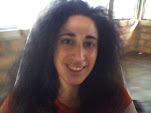Questions, questions questions.
What sort of questions do you ask yourself during the day? What sort of questions did you wonder about when you were a kid? Have the questions you ask changed as you've grown?
Did/do you wonder why certain things look the way they do, work the way they do? How do things work?
What if this happened? What does this mean?
Rosita and I were talking about asking questions, as part of fun library programming, and Miranda mentions a question she's wondered: Do ants have their own language? Do they talk to each other? What would they say? They look so organized, walking in a line, she says, carrying things so heavy! One must be the boss man, shouting "Walk faster! Straighten up!" Other ants carrying food must think "Ooooh, this is heavy." Such an inquisitive and creative mind.
Have YOU ever stared at an anthill and wondered about them? What other questions might you think of after looking at an anthill? What would you want kids to wonder about ants, as they are newly discovering the world?
Matt and Jeff are trying to get our library to formulate a research question with our local pit traps. (Pit traps are buckets put into the ground with mesh walls around them. Small animals fall into the buckets, they are observed by CH staff and then released). They are challenging the kids to pose a question about the animals in the environment that get caught in the pit traps. What comparisons or contrasts could be made? What predictions can you make? What do you think???
We were wondering aloud about formulating questions. Would kids be able to come up with a research question? Sometimes, for some people, it can be hard to find a spark of curiosity within them. There is so much you don't know you don't know! You know?
We have books in the library with questions written right there in the title. A nice series of youth science books written by Chris Arvetis that has titles like What is a Volcano? Why does it Snow? and Why do Birds Fly South? We thought these books could be a good exposure to creating their own questions. One other of those books, Why Does a Bird Sing? reminded me first of Maya Angelou's poem "I Know Why the Caged Bird Sings," and then of a song my friend Chase shared with me, that includes some of life's questions in it, titled "Louder than Words." It's from a musical, Tick Tick BOOM. Chase's favourite question in the song is: “Cages or wings, which do you prefer? Ask the birds."
There are so many Why's and How’s out in the world, so many little mysteries of life that can be unveiled or simply pondered. Some questions have no answers, or lessons, but the mere asking of them indicates a healthy zest for mental activity, it colours the world more intensely around us. Cages are stability, but wings are variability. Cages are protection, but wings are freedom. Knowledge is another form of freedom.
Matt's most recent article in Guyana Times featured the Divine Lizard, but really was a medium for encouraging scientific exploration and inquiry. He leads the reader into a scenario, where you are the one observing, hearing, wondering and remembering. He concludes with:
"... in the end, it is not just what you saw that contributes to your overall satisfaction, but also the feeling that were an active participant in the experience. You feel like a scientist because you acted as one. You actively observed the world around you and you leave with the confidence gained from answering your own questions out in the environment. The more you seek to observe, the more you will see. The more questions that you ask, the more you will learn. Nature is full of amazing and miraculous behaviours, traits and events, but the only catch is that you have to be out there to experience them."
Inquisitive young minds are something that seems to be only recently revealing itself here in Yups, Aunty Maisie says. I’ve seen it for myself, as well. For example, little Nicole, Felix's daughter, asked me the other day, "How do you make popcorn?" I went through the process and explained about what’s inside the kernels and she listened to it all, intently. Maisie said kids never used to ask questions like that. What an encouraging change!
It seems like that might be the necessary first step - to get people to ask questions, the kind of questions that will lead to the answers (and actions, hopefully) you are already hoping for - to make a true change.
What questions can you ask today, to brighten your environment?
Subscribe to:
Post Comments (Atom)

No comments:
Post a Comment